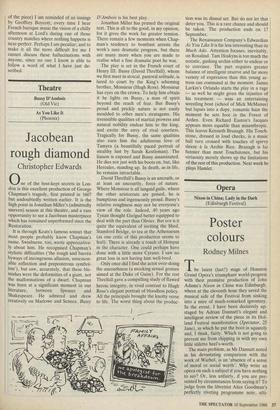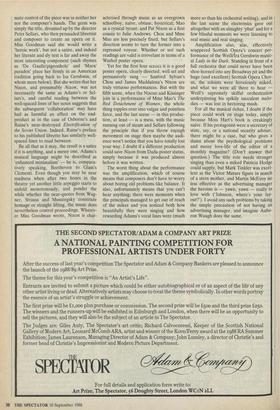Opera Nixon in China; Lady in the Dark (Edinburgh Festival)
Poster colours
Rodney Milnes
The latest (last?) stage of Houston Grand Opera's triumphant world-progress with their premiere production of John Adams's Nixon in China was Edinburgh, where at the eleventh hour they saved the musical side of the Festival from sinking into a mire of much-remarked ignominy. In the event, I have been decisively up- staged by Adrian Dannatt's elegant and intelligent review of the piece in its Hol- land Festival manifestation (Spectator, 25 June), in which he put the boot in squarely and, I think, fairly. Which is not going to prevent me from chipping in with my own little stiletto heel's-worth.
The main problem, as Mr Dannatt noted in his devastating comparison with the work of Warhol, is an 'absence of a sense of moral or social worth'. Why write an opera on such a subject if you have nothing to say? Or, less unfairly, if you are pre- vented by circumstances from saying it? To judge from the librettist Alice Goodman's perfectly riveting programme note, ulti- mate control of the piece was in neither her nor the composer's hands. The germ was simply the title, dreamed up by the director Peter Sellars, who then persuaded librettist and composer to create an opera on it. Miss Goodman said she would write a `heroic work', but not a satire, and indeed her literate and sly text is far and away the most interesting component (such rhymes as 'De Gaulle/pigeonhole' and 'Marx/ paradox' place her firmly in an American tradition going back to Ira Gershwin, of whom more below). But she writes that her Nixon, and presumably Nixon, was not necessarily the same as Adams's or Sel- lars's, and careful reading between the well-spaced lines of her notes suggests that the subsequent 'collaboration' may have had as harmful an effect on the end- product as in the case of Osborne's and Raine's near-destroyed Electrification of the Soviet Union. Indeed, Raine's preface to his published libretto has similarly well- spaced lines to read between.
Be all that as it may, the result is a satire if it is anything, and a messy one. Adams's musical language might be described as 'enhanced minimalism' — he is, compara- tively speaking, Beethoven to Glass's Clementi. Even though you may be near madness when after two hours in the theatre yet another little arpeggio starts to unfold monotonously, and ponder the while whether the near-quotes from Wag- ner, Strauss and Mussorgsky constitute homage or straight lifting, the music does nevertheless control proceedings. Whatev- er Miss Goodman wrote, Nixon is char-
acterised through music as an overgrown schoolboy, naïve, obtuse, hysterical; Mao as a cynical tyrant; and Pat Nixon as a first cousin to Julie Andrews. Chou and Mme Mao are less precisely fixed, but Sellars's direction seems to turn the former into a repressed voyeur. Whether or not such readings are valid is irrevelant in terms of a Warhol poster opera.
Yet for the first four scenes it is a good poster opera, clearly directed, well set and persuasively sung — Sanford Sylvan's Chou and James Maddalena's Nixon are truly virtuoso performances. But with the fifth scene, when the Nixons and Kissinger join in a performance of Mme Mao's The Red Detachment of Women, the whole thing topples over into vulgar and pointless farce, and the last scene — in this produc- tion, at least — is a mess, with the music running out of steam and Sellars following the principle that if you throw enough movement on stage then maybe the audi- ence won't notice that you have totally lost your way. I doubt if a different production could save Nixon from Dada-poster status, simply because it was produced almost before it was written.
The worst thing about the performance was the amplification, which of course means that composers don't have to worry about boring old problems like balance. It also, unfortunately means that you can't hear anything; there were moments when the principals managed to get out of reach of the mikes and you noticed both how beautifully they were singing and how rewarding Adams's vocal lines were (much more so than his orchestral writing), and in the last scene the electronics gave out altogether with an almighty 'phut' and for a few blissful moments we were listening to real music and real singing.
Amplification also, alas, effectively scuppered Scottish Opera's concert per- formance of the Weill/Ira Gershwin music- al Lady in the Dark. Standing in front of a full orchestra that could never have been shoe-horned into any Broadway pit and the huge (and excellent) Scottish Opera Chor- us, the soloists were ferociously miked, and what we were all there to hear — Weill's supremely skilful orchestration underpinning his spikily succulent melo- dies — was lost in hectoring mush.
For all the musical riches, I doubt if the piece could work on stage today, simply because Moss Hart's book is creakingly naïve. If his protagonist were a secretary of state, say, or a national security adviser, there might be a case, but who gives a damn about the psychological problems and messy love-life of the editor of a monthly magazine? (Don't answer that question.) The title role needs stronger singing than even a miked Patricia Hodge could supply, but Mark Tinkler was excel- lent as the Victor Mature figure in search of a stern mother, and Martin McEvoy no less effective as the advertising manager the heroine is — yawn, yawn — really in love with (`Johnson, where's your lay- out?'). I avoid any such problems by taking the simple precaution of not having an advertising manager, and imagine Aube- ron Waugh does the same.























































 Previous page
Previous page